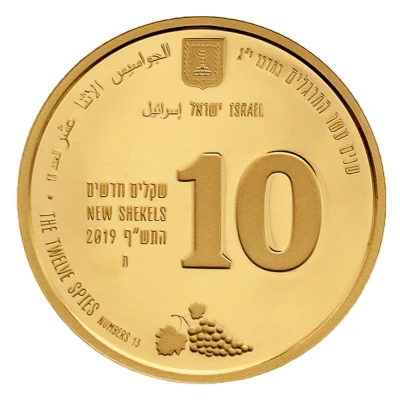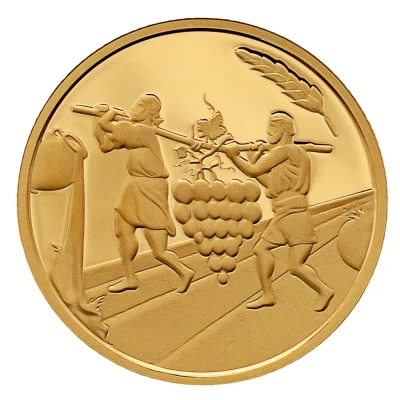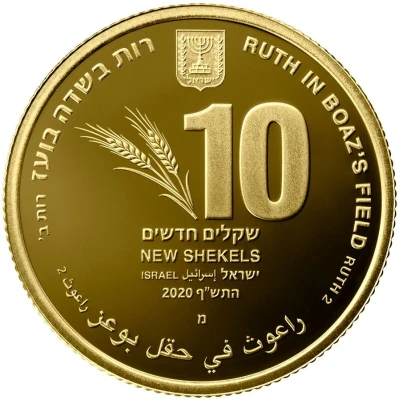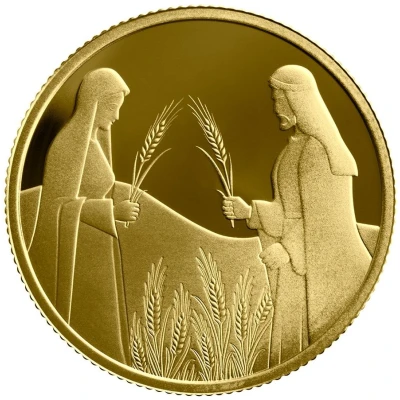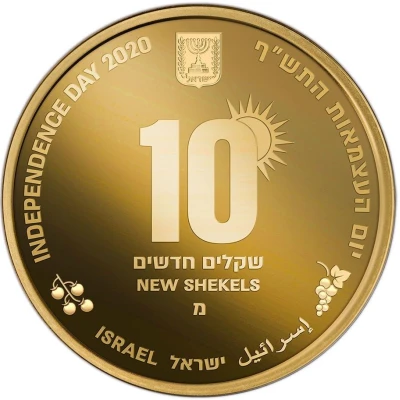
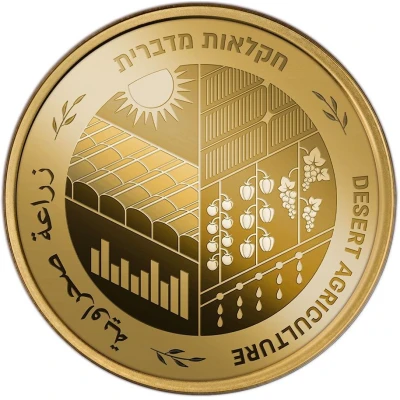

© Israel Coins and Medals Corp.
10 New Shekels Desert Agriculture in Israel
5780 (2020) year| Gold (.917) | 16.96 g | 30 mm |
| Issuer | Israel |
|---|---|
| Period | State of Israel (1948-date) |
| Type | Non-circulating coin |
| Year | 5780 (2020) |
| Calendar | Hebrew |
| Value | 10 New Sheqalim 10 ILS = USD 2.62 |
| Currency | New Shekel (1986-date) |
| Composition | Gold (.917) |
| Weight | 16.96 g |
| Diameter | 30 mm |
| Shape | Round |
| Technique | Milled |
| Orientation | Medal alignment ↑↑ |
| Updated | 2024-10-05 |
| Numista | N#237278 |
|---|---|
| Rarity index | 100% |
Reverse
Border inscription: "Desert Agriculture" in English, Hebrew and Arabic, and olive branches. Left, the strong desert sun, greenhouses and rectangles of a histogram, signifying control of growth conditions in the greenhouses. Right, panels for production of solar energy, grapes, peppers and tomatoes, representing the fruits and vegetables grown in the Negev. Below, drops of water and pipes symbolize the drip irrigation.
Scripts: Arabic, Hebrew, Latin
Designer: E R Design Team
Edge
Reeded
Comment
Israel is one of the world's leading nations of innovation in desert agriculture. The Independence Day Coin issued this year in celebration of Israel's 72nd anniversary is a proud salute to our nation's achievements.Agriculture in the Negev Desert already existed in ancient times. With the establishment of the modern State in 1948, the dream of Israel's first Prime Minister David Ben Gurion was to make the desert bloom and he strongly encouraged settlement of the Negev and Judean Deserts. However, with the underlying fact that 60% of Israel's territory was desert land, there was a need to overcome the challenges of a hot, dry climate, and Israel achieved this with success. Use of advanced technology and techniques led to production of some of the world's highest and best agricultural yields in desert conditions, in relatively small areas.
As the country's population grew, agricultural areas diminished in size and it became even more important to take advantage of the Negev Desert region. The need for water conservation led to development of the most efficient means of irrigation, including the use of recycled water and drip irrigation originally developed in Israel. The saline water of the desert was found good for olives, fish farming and growing Jojoba, from which oil is extracted for cosmetics.
Fruit and vegetables, including some of the world's sweetest cherry tomatoes, are grown today in abundance in hi-tech greenhouses. In the southern Negev, where 2,000 years ago, the Nabateans found favorable conditions for cultivating grapevines, grapes are grown for wine, today. In the Arava in the far south and further north in the Jordan Valley, the popular Medjoul dates are grown with emphasis on the tasty "Bonbon" variety, which are exported to about 30 different countries. Meeting the challenges of the desert has created a "desert revolution" in Israel, the seeds of which have become distributed all over the world. Many other countries, also coping with these same climatic challenges today, look to Israel for help.
Interesting fact
The 10 New Shekels (Desert Agriculture in Israel) 5780 (2020) coin from Israel is a non-circulating coin, meaning it is not intended for general circulation and is instead produced in limited quantities for collectors and investors.
Price
| Date | Mintage | VG | F | VF | XF | AU | UNC |
|---|---|---|---|---|---|---|---|
| 5780 (2020) מ | 555 | - | - | - | - | - | - |
Values in the table are based on evaluations by sales realized on Internet platforms. They serve as an indication only for 10 New Shekels (Desert Agriculture in Israel) 5780 (2020) coin.
